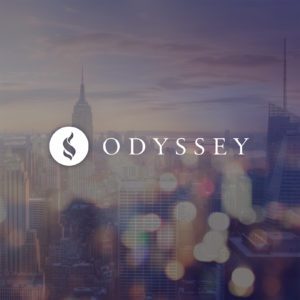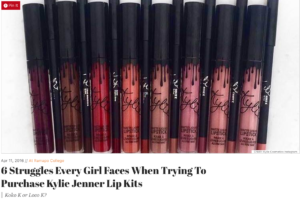If you’re a college student not living under a rock, you probably see a link to an Odyssey article at least once per month. But here is a bit of context for those who’ve been blessed to not come across one of these literary train wrecks before: The Odyssey Online is a user-generated, blog-style website which prides itself on “democratizing content creation while personalizing discovery.” The main selling for the Odyssey is that it opens its doors to over 15,000 college-aged contributors with minimal restrictions or qualifications.
Which sounds like a cool idea until you realize that’s exactly where the problem lies.

I’d never visited The Odyssey’s website until I started research for this article, so when their homepage encouraged me to “Open up to new perspectives and ideas,” and “enrich my life,” I was optimistic. But after a few minutes of browsing, it quickly became apparent that articles like “15 Reasons Why Breakfast is the Best,” and “10 Qualities That Make Lip Gallagher Absolutely Irresistible” couldn’t remotely enrich anyone’s life, and as a matter of fact, do more harm than good for those who read them.
Aside from the trite nature of much of The Odyssey’s content, it’s riddled with grammatical errors despite (apparently) going through an editorial process which I can’t imagine is any more thorough than the average person’s skimming of Apple’s terms and conditions. But all joking aside, if The Odyssey is any indication of my generation’s potential, we should be seriously concerned. The problem is not that The Odyssey has a multitude of writers. The problem is that these writers perpetuate an online environment in which any serious discussion, serious work, serious anything really, is marginalized to make room for self-indulgent trash – and the “editors” are complicit in the process.
When questioned about The Odyssey’s frequent publishing of list articles (also known as “listicles”) in efforts to appeal to an illiterate generation, then-managing editor, Kate Waxler, defended the platform claiming that only “some” of the highest-trafficked articles are listicles.
“From the extreme depth of content we get every day,” said Waxler, “I can see that this generation is hungry and eager to be informed and engaged.”
This statement, coming from the managing editor of the publication which allowed the article that turned the dad-bod into an Internet sensation is, to say the least, rich.
The Odyssey’s purpose is not to inform, educate, or enlighten. Its purpose is to coddle its readers and confirm their biases while collecting pay-per-click ad revenue. It is the publication for readers whose only other sources of information are Snapchat’s Discover stories and Instagram’s Popular page. It’s like the gray sweatpants of online publications: something heinously unattractive, but comfortable and easy to use.
To be fair, it should be noted that The Odyssey is only a symptom of our intellectual decline, not the disease itself. It’s not the only culprit of spewing baby talk under the guise of journalism. Indeed, it is one of many. But one would think that an organization with the capability to democratize content supplemented by such a massive following would hold itself to higher standards that benefit the public. Sadly, it’s leaders are too easily seduced by money and page views.
“Your voice matters,” reads one banner on the website. “Be heard.”
Alright, I’ll be the one to blow the whistle: Should you really be heard when the extent of your research is aimless scrolling through trivia and celebrity gossip? Should you really be heard when the basis for your writing is your feelings about a Netflix show that you binge watch while eating ice cream? On one hand, I admire the courage it takes to expose one’s work to the public’s eye. But when a toddler draws a hideous picture, you don’t show it off to the whole neighborhood – you hang it on the fridge for a few days until the kid’s drawing skills improve.

The Odyssey states that its contributors write “long-form articles,” which have apparently been conflated with 400-word listicles such as the “6 Struggles Every Girl Faces When Trying to Purchase Kylie Jenner Lip Kits” and “Definite Proof That Minnesota Is Better Than Wisconsin.”
These are “the voices of the millennial generation…today’s leaders, visionaries, innovators and thought-provokers,” says The Odyssey. “What you see represents nothing other than authentic ideas that the community deems important.”
But even if there are some gems amidst this landfill of content – which I’m sure there are – the stigma of The Odyssey inevitably taints them. It’s like broadcasting the State of the Union address on Spike TV. The medium overrides the message. The result is that nothing of significance ever arises out of these articles besides a quick hit of instant gratification. No lasting discussion, no reflection, no critical thought. Just a flash in the pan only to be replaced by next week’s trend.
The Odyssey’s 15,000-plus contributors may delude themselves into thinking they’re enriching the lives of readers. But once we see through their thin veil of pseudo-journalism and set aside the empty encouragement of their peers which fuels them, all that remains is a curation of glorified Facebook rants.
The Odyssey exists to make money, not to help us “connect and learn with ideas from around the world.” Spokespeople for The Odyssey boast of expanding their contributor network and growing their revenue, though they decline to provide specific revenue figures.
Sites such as Bleacher Report and The Huffington Post, both of which started as user-generated content platforms similar to The Odyssey, soon lost credibility due to shoddy writing by amateurs and were forced to employ legitimate reporters to sustain their businesses. The Odyssey will also fail soon enough if it maintains its current model. Its editors will lose control of the barrage of content needed to generate sufficient ad revenue to pay its employees. The quantity-over-quality model will cannibalize itself.
It’s also possible that readers will grow sick and tired of meaningless content. In this case, The Odyssey would cease to generate sufficient per-click ad revenue and be forced to downsize. In other words, if you don’t want to see Odyssey links of your timeline, the responsibility lies in your hands: No clicking means no money.
Just something to think about next time you want to dive into “The 14 Phases of Registering for Classes, As Told by ‘High School Musical.’”
Dominic Vaiana studies writing and media strategy at Xavier University. You can get the PDF “11 Immutable Writing Lessons from Legendary Authors” along with his personal articles, essays, interviews, and book recommendations by joining his monthly newsletter.
Quality read, Dom. I concur with everything said about Odyssey, it’s borderline ClickBait that masquerades itself as sophisticated journalism. I’ve read one article from them on Facebook about a month ago, it was totally spineless writing. Most people probably know this by now, but I’m glad to see you
Exposing the frauds of online penmanship. Keep the articles coming man.
-Wally
Enjoyed reading this, couldn’t agree more.
Maybe you should tone it down .. sorry not everyone takes things as serious as you & FYI being an Odyssey writer is a great resume builder, my boss loves that I write for them
I’d love to meet your boss.
Its kind of shameful that your belittling other people for writing what’s important to them. That’s the point of free speech
It’s*
you’re*
So as you know, I read this right when you posted it and I told you that I agree/disagree and I admit it even made me take a step back. Since I do, well I did, write for them as a “creator”, I’m now happy that you wrote this because it opened up my mind and helped me decide whether writing for them benefits anyone or even myself, and it really didn’t so I decided to no longer write anymore. So basically I’m writing this to say thanks and to keep putting yourself out there with your work!
Glad you made the right decision – lots of other ways to express yourself creatively.
Agreed!
I write so I have deadlines and it forces me to use my voice. I used to write all the time. I feel as if you are a little pretentious. Also, you make fun of our listicles yet one of your next articles is, in fact, a listicle. Who are you to judge how writers write? Or on what website? Or what they write about? Odyssey never claimed to be a news source which is what you are indicating you wished it would be. Sure, most of our articles are little fluff pieces, but a lot goes into them. I can’t speak for other Odyssey branches besides my own, but I have had multiple edit cuts, and my title almost always gets changed from what I have it as, and for the better.
I’d rather be pretentious than write puff pieces for a digital sweatshop that profits off the trivialization of culture. Obviously the article struck a nerve — maybe that’s a sign you should reconsider what the Odyssey really stands for.